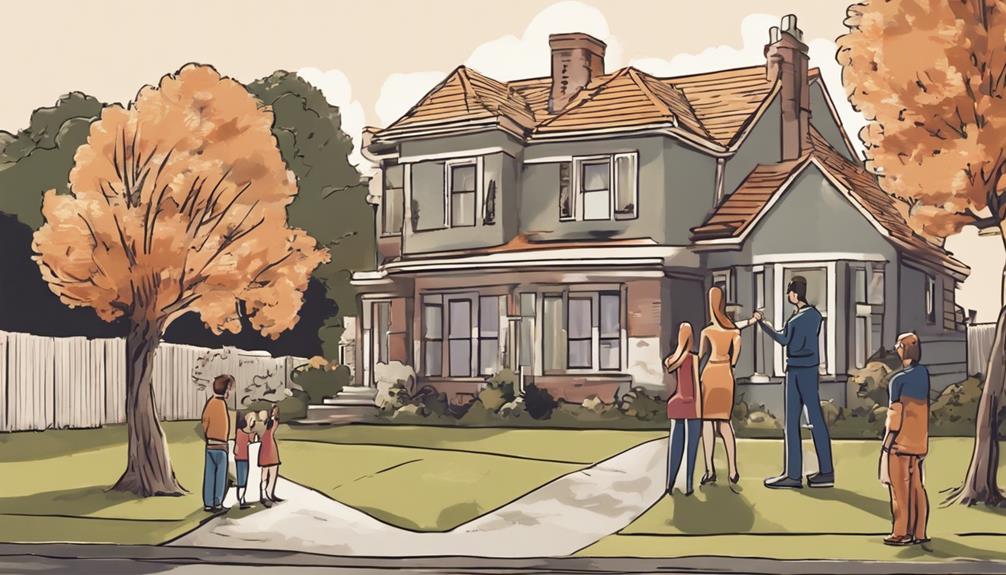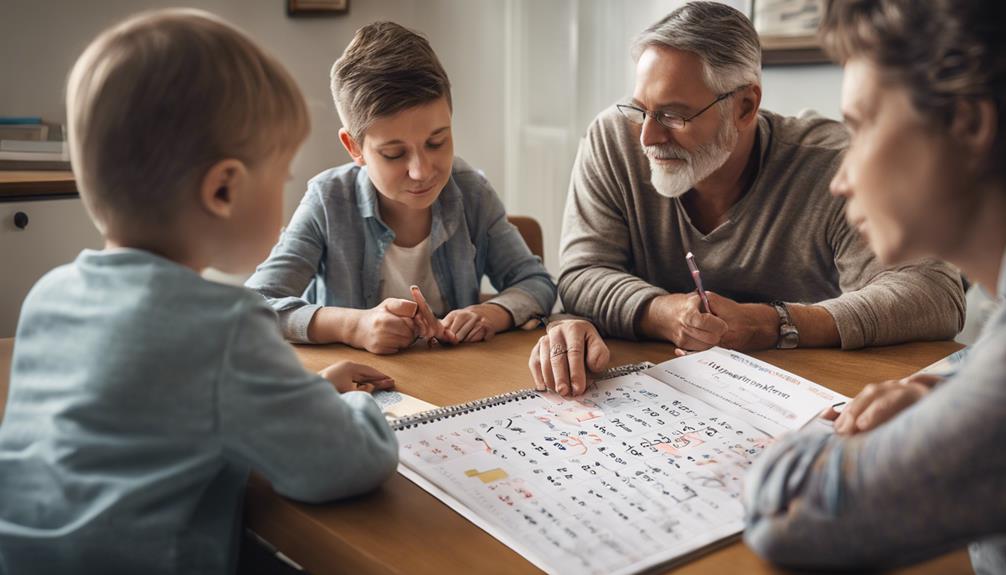In the complex maze of divorce proceedings, determining who takes ownership of the house can seem like trying to find your way through a labyrinth without any guidance.
When children are part of the equation, the stakes are even higher, adding layers of complexity to an already emotionally charged situation.
As we explore the intricacies of determining house ownership in divorce scenarios involving children, we uncover a delicate balance that requires careful consideration and thoughtful planning.
Let's unravel the threads of this intricate decision-making process together, shedding light on the crucial factors that guide this pivotal choice.
Key Takeaways
- Consider children's well-being and stability as top priorities in house allocation.
- Seek legal advice to navigate complexities and ensure fair decisions for children.
- Collaborate with the ex-partner to reach an amicable resolution focusing on children.
- Prioritize maintaining children in their current home for emotional security and stability.
Factors to Consider in House Allocation
When deciding on house allocation during a divorce with children, we carefully consider various factors to ensure the well-being of all involved. The marital home holds sentimental value and stability for the family, especially when children are involved. Courts often prioritize maintaining children in their current home to minimize disruption during divorce proceedings. The custodial parent, who often has primary physical custody of the children, may have a stronger case for being awarded house ownership due to the children's well-being. However, legal complexities can arise when determining house ownership in the presence of children, making it crucial to seek legal advice to navigate these intricacies.
Ensuring the children's well-being is paramount in deciding house ownership, as the emotional impact of moving out of their familiar environment can be significant. By carefully considering the children's needs and emotional stability, we aim to create a post-divorce living arrangement that promotes a sense of security and continuity for them. It's essential to approach the allocation of the marital home with a strategic and compassionate mindset, always keeping the children's best interests at the forefront.
Impact on Children's Well-being

Considering the impact on children's well-being is paramount when determining house ownership in a divorce. Maintaining stability and continuity in their living environment can significantly influence their emotional adjustment. In such challenging times, children need our utmost care and attention to navigate this transition smoothly.
Here are key points to consider:
- Emotional Security: Ensuring that children feel safe and secure in their living environment is crucial for their well-being.
- Minimizing Stress: Minimizing disruptions and changes can help reduce the stress children may experience during the divorce process.
- Stability and Continuity: Maintaining a sense of stability and continuity by allowing children to remain in their familiar surroundings can support their emotional adjustment.
- Court Considerations: Courts often prioritize the best interests of the children, which may involve keeping them in the family home for consistency.
- Children's Needs: Putting children's needs at the forefront of house ownership decisions can help create a supportive environment for their emotional growth and development.
Legal Considerations for House Division
In navigating the legal considerations for house division in a divorce involving children, prioritizing the well-being and stability of the children is paramount. The decision-making process around house ownership can significantly impact the children's lives, making it crucial to approach this aspect with care and foresight. Legal complexities often arise when children are involved in house ownership decisions during divorce, underscoring the importance of seeking professional legal advice to ensure a smoother transition for all parties.
When determining house ownership in a divorce with children, the custodial parent may have a better chance at retaining the home to provide stability for the children. Courts often lean towards maintaining children in their current home to minimize disruption. Here is a breakdown of key factors to consider:
| Factors to Consider | Importance |
|---|---|
| Children's well-being | High |
| Custody arrangements | Significant |
| Legal complexities | Considerable |
| Division of assets | Essential |
Options for House Settlement

Navigating through the complexities of house division in a divorce with children requires a thoughtful exploration of the available options for house settlement that prioritize the well-being and stability of all involved. When deciding on house settlement in a divorce with children, several key options can be considered:
- Retaining the House for Stability: The custodial parent may have a higher chance of retaining the house to maintain stability for the children.
- Legal Advice Guidance: Seeking legal advice can provide crucial assistance in navigating the legal complexities surrounding house ownership decisions in a divorce with children.
- Court Considerations: Courts may prioritize keeping the children in their current home when determining house ownership in a divorce.
- Children's Well-being: The well-being of the children should be central to any decision made regarding house settlement.
- Deciding Ownership Together: Collaboration between both parents in deciding house ownership can lead to more amicable and effective outcomes for all involved.
Considering these options with empathy and a focus on the children's stability is paramount in the decision-making process.
Collaborative Decision-Making Process
During a divorce with children, prioritizing collaborative decision-making ensures that the well-being of the children remains at the forefront of determining house ownership. It is crucial to consider factors such as stability and continuity for the children when making these decisions. The custodial parent, who often provides the primary care for the children, may have a stronger case for keeping the house to maintain a stable environment. However, legal complexities can arise, making it essential to seek legal advice to navigate the process smoothly.
| Collaborative Decision-Making | Children's Well-Being | Stability for Children |
|---|---|---|
| Involves considering children's needs and opinions | Places the children's welfare as the top priority | Aims to provide a consistent and secure environment for the children |
Collaborating with your ex-partner and putting the children's needs first can lead to a more amicable resolution. By prioritizing the children's stability, continuity, and well-being, you can work towards a decision that ensures a secure and supportive environment for them during this challenging time.
Frequently Asked Questions
What Not to Say to Kids During Divorce?
During divorce, we avoid sharing adult details, asking kids to choose sides, or using them as messengers. Negativity about the other parent or discussing legal and financial matters is off-limits. We prioritize their emotional well-being.
How a Child Can Deal With the Negative Impact of Divorce?
We navigate the negative impacts of divorce with children by fostering open communication, providing stability, and encouraging emotional expression. Seeking professional help when needed and involving children in decisions show love and support.
What Is the First Thing to Do When Separating?
Assess immediate needs, consult legal advice, explore temporary housing, prioritize children's well-being. Open communication and cooperation are key. Stay focused on solutions for a smooth transition. Together, we can navigate this challenging time.
How Can Divorce Benefit a Child?
Divorce can benefit a child by fostering a healthier family environment. It may reduce conflict, leading to improved mental well-being, better co-parenting, and opportunities for growth. Prioritizing children's needs post-divorce can create a stable, nurturing space for them.
Conclusion
As we navigate the challenging terrain of divorce with children, the decision of who gets the house requires careful consideration. Balancing the children's stability with legal complexities, we must prioritize their well-being above all else.
Through open communication and a collaborative approach, we can ensure a smooth transition for all involved. Let's tread carefully, with empathy and foresight, as we carve out a new path towards peace and stability for our children.










